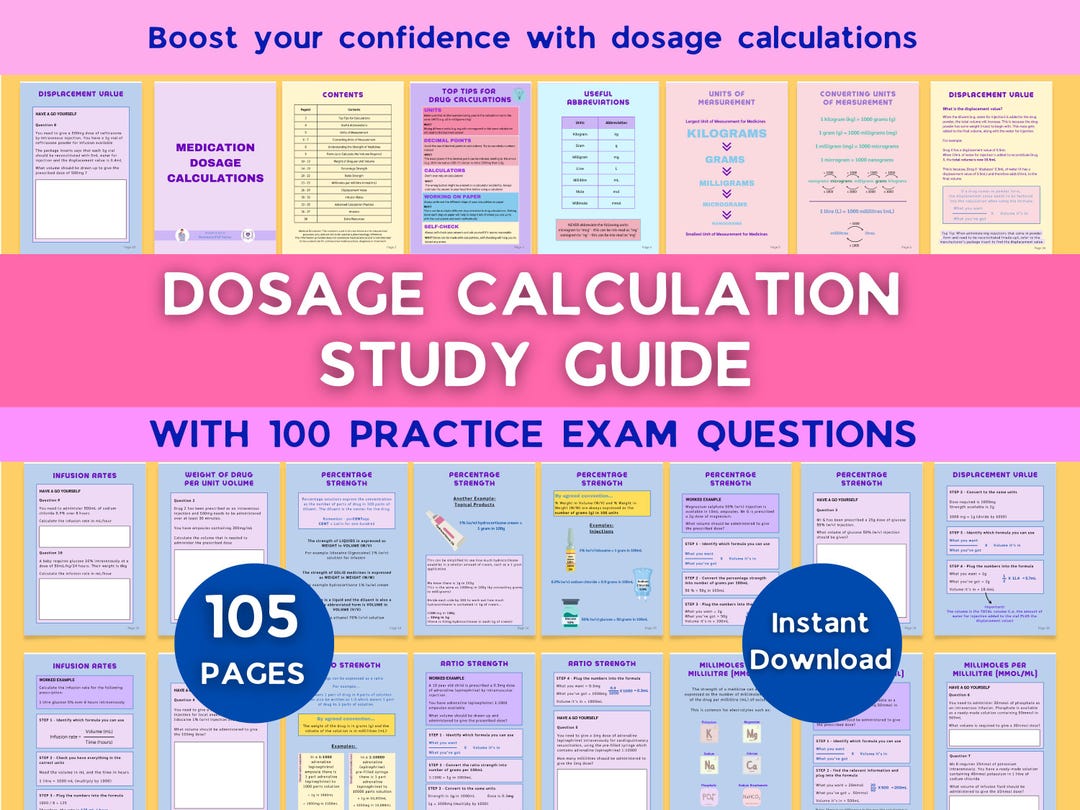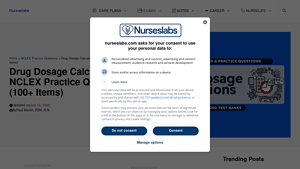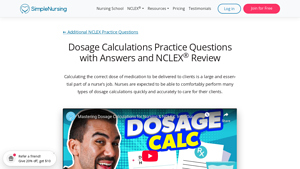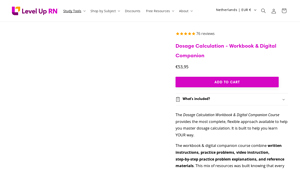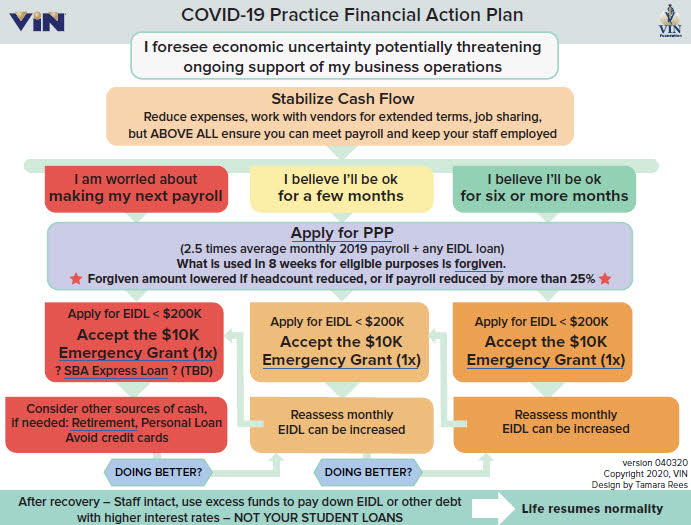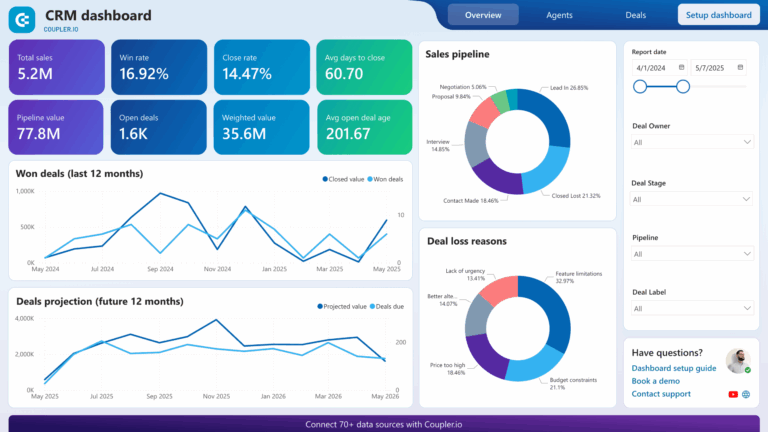Free Dosage Calculation Practice Calculators: Our Top 5 Picks for 2025
Finding the Best Dosage Calculation Practice: An Introduction
Finding the right dosage calculation practice tool can be a daunting task for nursing students and professionals alike. With numerous resources available online, it’s challenging to determine which tools are not only effective but also reliable and user-friendly. Whether you are preparing for the NCLEX exam or simply looking to enhance your medication calculation skills, having access to quality practice resources is crucial for building confidence and competence in dosage calculations.
The goal of this article is to review and rank the top online tools for dosage calculation practice. By providing detailed insights into each tool, we aim to save you time and effort in your search for the best options. We understand that your time is valuable, and selecting the right practice resource can significantly impact your learning experience.
To ensure a comprehensive evaluation, we have established specific criteria for ranking these tools. Key factors include accuracy, which reflects the reliability of the questions and solutions; ease of use, encompassing the user interface and accessibility of the tools; and features, such as the variety of practice questions, feedback mechanisms, and additional resources provided. By focusing on these criteria, we hope to guide you toward the most effective dosage calculation practice tools available online, helping you to master this essential skill in nursing and healthcare.
Our Criteria: How We Selected the Top Tools
Selection Criteria for Dosage Calculation Practice Tools
When evaluating the best online tools for dosage calculation practice, we considered several key factors that are crucial for users looking to enhance their skills. Below are the criteria that guided our selection process:
-
Accuracy and Reliability
– The primary purpose of dosage calculation tools is to ensure accurate medication dosing. We prioritized tools that provide reliable calculations and are based on established medical standards. Each tool was assessed for its ability to minimize errors in calculations, which is critical for patient safety. -
Ease of Use
– A user-friendly interface is essential, especially for students and healthcare professionals who may be under pressure. We looked for tools that offer intuitive navigation, clear instructions, and a straightforward input process. The ability to quickly access and utilize the tool without extensive training was a significant factor. -
Key Features
– The best dosage calculation tools should include features that enhance the learning experience. We focused on tools that offer:- Variety of Calculation Types: Options for calculating oral medications, intravenous (IV) dosages, and pediatric dosing.
- Instant Feedback: Mechanisms to provide immediate results and explanations for correct and incorrect answers to facilitate learning.
- Practice Quizzes and Challenges: A range of quizzes that simulate real exam conditions, allowing users to gauge their understanding and readiness.
-
Cost (Free vs. Paid)
– Accessibility is a vital consideration. We evaluated whether the tools are free or require a subscription. Free tools that offer comprehensive resources and practice opportunities were given priority. For paid tools, we assessed the value provided in terms of features, content depth, and user support. -
Content Quality
– The educational material accompanying the tools is crucial for effective learning. We analyzed the quality of the questions, explanations, and rationales provided. Resources that include well-researched content and up-to-date information on medication calculations were favored.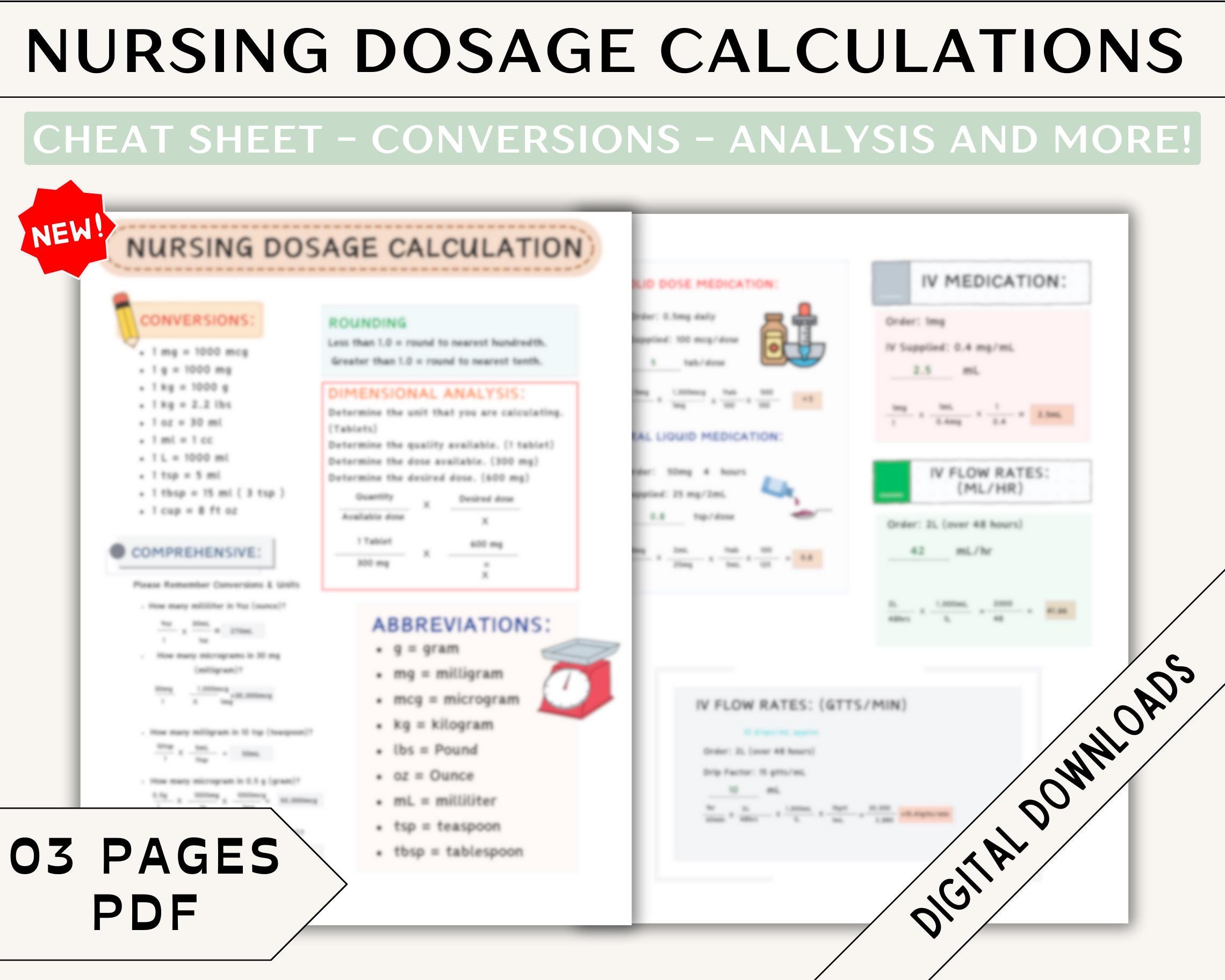
-
User Reviews and Feedback
– We considered the experiences of other users by examining reviews and testimonials. Tools with positive feedback regarding their effectiveness, ease of use, and overall satisfaction were prioritized. -
Mobile Compatibility
– In today’s fast-paced environment, the ability to practice dosage calculations on mobile devices is important. Tools that offer mobile-friendly interfaces or dedicated apps were given additional consideration to accommodate users who prefer learning on the go.
By applying these criteria, we aimed to curate a list of dosage calculation practice tools that not only enhance learning but also support the development of critical skills necessary for safe and effective nursing practice. Each selected tool represents a balance of functionality, accessibility, and educational value, making them ideal for both students and practicing professionals.
The Best Dosage Calculation Practices of 2025
1. Drug Dosage Calculations NCLEX Practice Questions (100+ Items)
The “Drug Dosage Calculations NCLEX Practice Questions” resource from Nurseslabs is designed to help nursing students and professionals enhance their skills in drug dosage calculations. Featuring over 100 practice items, this comprehensive test bank allows users to assess their competency in essential nursing calculations. It serves as a valuable tool for NCLEX preparation, ensuring that users are well-equipped to handle real-world medication dosing scenarios confidently.
- Website: nurseslabs.com
- Established: Approx. 15 years (domain registered in 2010)
4. Dosage Calculations Practice Questions & NCLEX Review
The “Dosage Calculations Practice Questions & NCLEX Review” from Simple Nursing is a valuable resource designed to help nursing students master dosage calculations essential for the NCLEX exam. This free tool offers a collection of practice questions along with detailed answers, essential insights, and instructional videos to enhance understanding. Its comprehensive study materials aim to bolster topical mastery, ensuring users are well-prepared for their nursing assessments.
- Website: simplenursing.com
- Established: Approx. 13 years (domain registered in 2012)
5. Dosage Calculation
The Dosage Calculation Workbook & Digital Companion from LevelUpRN offers a comprehensive and flexible resource designed to enhance your mastery of dosage calculations. With a high rating of 4.8 from 69 users, this tool combines a workbook format with a digital companion, providing a well-rounded approach to learning. Its features aim to simplify complex calculations, making it an essential asset for nursing students and professionals looking to strengthen their skills in medication dosage.
- Website: leveluprn.com
- Established: Approx. 7 years (domain registered in 2018)
How to Get the Most Accurate Results
Double-Check Your Inputs
When using online dosage calculation tools, accuracy begins with your inputs. Before hitting ‘calculate’, take a moment to review the data you’ve entered. Ensure that you’ve selected the correct units (milligrams, milliliters, etc.) and that numerical values are accurate. A simple typo can lead to significant errors in medication administration. It’s advisable to cross-reference the information with reliable sources or clinical guidelines to confirm that the figures are correct.
Understand the Underlying Assumptions
Each dosage calculation tool may operate under specific assumptions regarding measurement systems, rounding rules, or conversion factors. Familiarize yourself with these assumptions to understand how they may impact your results. For instance, some calculators may use the metric system exclusively, while others might allow for conversions between metric and household measurements. Knowing these details can help you interpret results more effectively and avoid potential pitfalls.
Use Multiple Tools for Comparison
To ensure you are getting the most accurate results, consider using more than one dosage calculation tool. Different tools may employ varying algorithms, leading to slightly different outcomes. By comparing results from multiple calculators, you can identify any discrepancies and understand the range of possible answers. This practice enhances your confidence in the final dosage you decide to administer.
Review the Rationales
Many online tools provide explanations or rationales for their calculations. Take the time to read these rationales, as they can offer insights into the reasoning behind the calculations. Understanding the steps taken to arrive at a particular answer can deepen your knowledge and help reinforce your learning. If a calculator provides incorrect results or you find a discrepancy, reviewing the rationale can help you pinpoint where the error occurred.
Regularly Update Your Knowledge
Dosage calculations are not just about using tools; they also require a solid understanding of pharmacology, measurement systems, and conversion techniques. Regularly updating your knowledge through textbooks, online courses, or workshops will enhance your competency. Being well-informed will allow you to use online tools more effectively and make better clinical decisions.
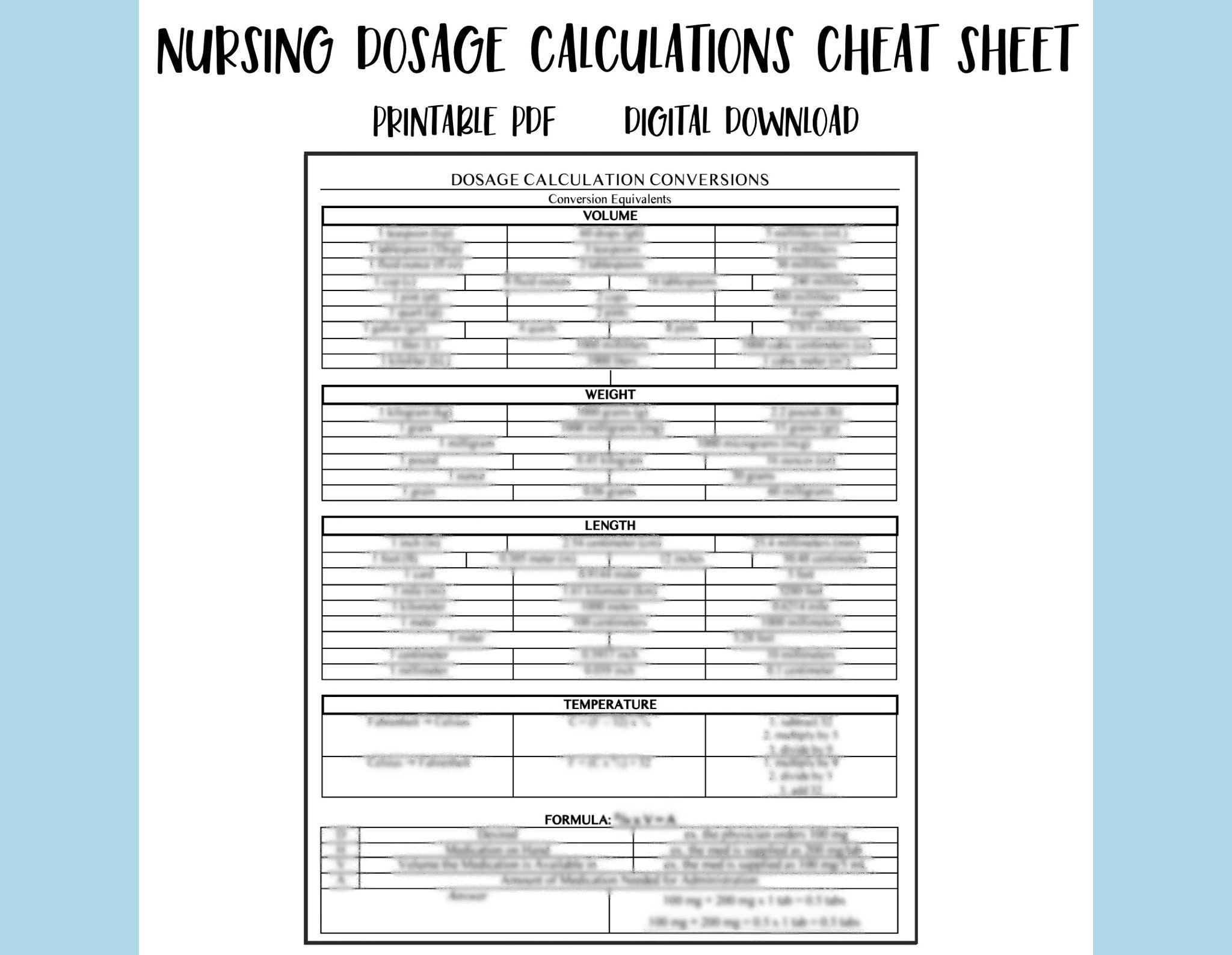
Seek Feedback and Guidance
Don’t hesitate to ask for feedback or assistance from colleagues, instructors, or supervisors when using dosage calculation tools. Discussing calculations with others can provide different perspectives and highlight potential errors. Additionally, they may recommend specific tools they’ve found effective or share tips that can help you refine your skills.
Practice Regularly
Like any skill, proficiency in dosage calculations improves with practice. Utilize online calculators frequently to work through various scenarios and reinforce your understanding. Engaging in regular practice will help you become more familiar with the tools and instill greater confidence in your calculation abilities.
Frequently Asked Questions (FAQs)
1. What is dosage calculation practice, and why is it important?
Dosage calculation practice involves exercises and quizzes that help healthcare professionals, especially nurses, improve their skills in calculating medication dosages. It is crucial because accurate dosage calculations ensure patient safety and effective treatment. Incorrect dosages can lead to medication errors, which can have serious consequences for patient health.
2. What types of dosage calculations should I practice?
When practicing dosage calculations, you should focus on several key areas:
– Oral Medications: Calculating doses for medications taken by mouth.
– Parenteral Medications: Understanding calculations for injections and intravenous (IV) medications.
– Fluid Intake and Output: Monitoring patient fluid balance, which is vital in various medical situations.
– Metric Conversions: Familiarizing yourself with converting units of measurement, as many dosages require this skill.
3. Are there free online resources for dosage calculation practice?
Yes, several online platforms offer free resources for dosage calculation practice. Websites like Nurseslabs provide extensive practice quizzes without requiring sign-ups or personal information. These quizzes often include immediate feedback and rationales for answers, making them an excellent tool for learning and self-assessment.
4. How can I effectively learn from dosage calculation quizzes?
To maximize your learning from dosage calculation quizzes, follow these tips:
– Read Rationales: After completing a quiz, review the rationales for both correct and incorrect answers to understand the reasoning behind each solution.
– Take Your Time: Approach each question at your own pace to ensure you fully grasp the concepts being tested.
– Practice Regularly: Consistency is key. Regular practice helps reinforce your understanding and builds your confidence in performing calculations accurately.
5. What should I do if I struggle with dosage calculations?
If you find dosage calculations challenging, consider the following strategies:
– Review Basic Math Skills: Refresh your understanding of basic arithmetic, fractions, and decimals, as these are foundational to dosage calculations.
– Utilize Study Guides: Many online resources offer comprehensive study guides that explain the principles behind dosage calculations and provide practice problems.
– Seek Help: If you’re still struggling, consider joining a study group, finding a tutor, or participating in online forums where you can ask questions and receive guidance from peers or professionals.
Important Disclaimer
⚠️ Important Disclaimer
The information and reviews in this guide are for educational purposes only and are based on publicly available information. We are not affiliated with any of the tools mentioned. Features and pricing may change. Always conduct your own research before choosing a tool for your needs.
